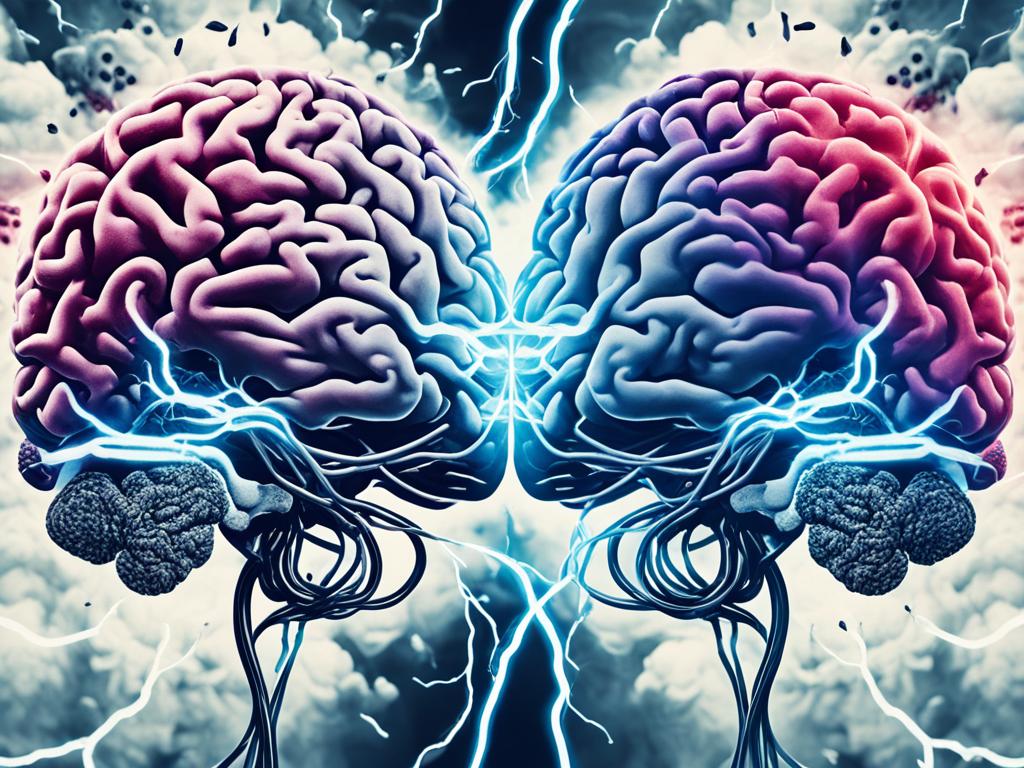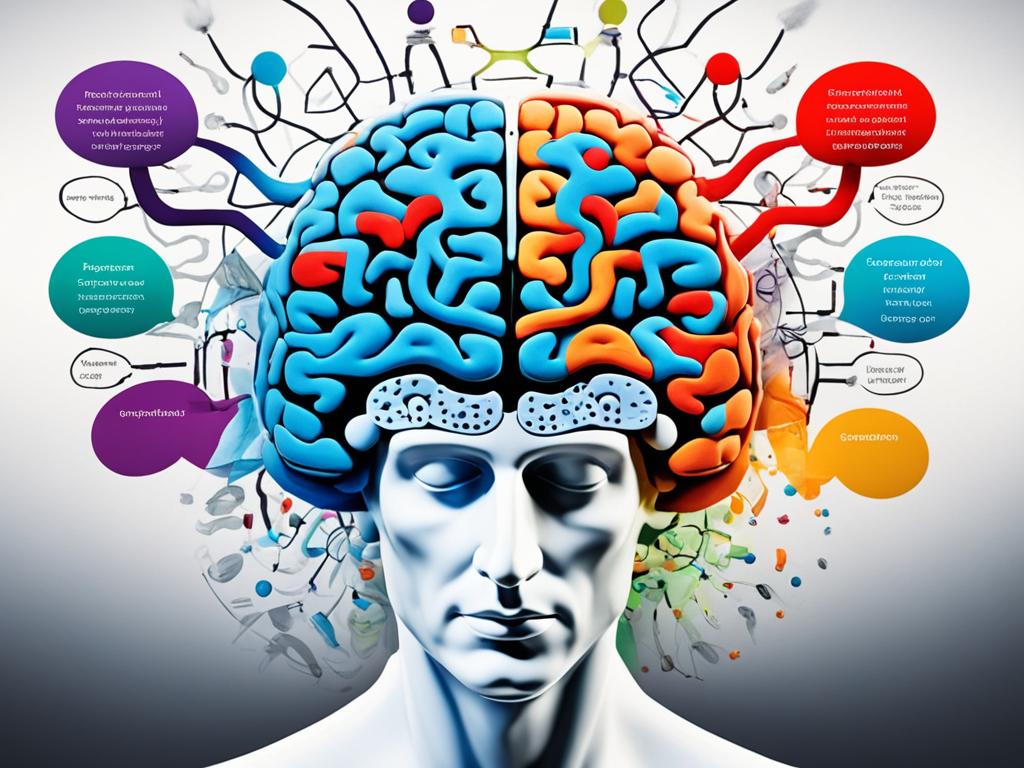Self-regulation is about managing how we behave, feel, and think to meet our long-term goals. It’s dealing with disappointments and sticking to your values.
Maturity is being able to handle emotional and social challenges with patience and deep thinking. If you can regulate yourself well, you keep true to what you believe in, stay cool when things get tough, and see problems as chances to grow.1 But, if self-regulation is a struggle, it might pave the way for mental health issues and risky choices.1
### Key Takeaways
– Self-regulation helps us control our actions, feelings, and thoughts for our big goals.
– Being mature means dealing with life’s tough parts calmly and wisely.
– Good self-control means staying true to ourselves, handling feelings, and seeing obstacles as chances.
– If we can’t regulate well, it might cause mental health problems and dangers.
– Learning things like being mindful and changing how we think can make self-regulation better.
Understanding Self-Regulation
Self-regulation is the power to control yourself. This means keeping a handle on emotions and actions.2 It’s about doing what’s best for yourself in the long run, following your values and goals.2
For emotions, it’s about managing how you feel.2 People who are good at this can avoid acting on sudden impulses. They can also lift their own spirits up when feeling blue. This shows they can handle their emotions and actions well.2
What is Self-Regulation?
Self-regulation theory explains how we decide on our thoughts, feelings, and actions. It includes setting goals, staying motivated, checking up on ourselves, and using our willpower.2 This whole process is vital for our well-being. It helps us stay away from bad choices and steer towards better ones.2
It’s all about keeping an eye on how we act, and comparing that to our own standards. Then, we adjust what we do based on this comparison.2 When it comes to learning, it means taking charge of how you learn. This involves making plans, keeping track of your progress, and then thinking about how it all went.2
Behavioral vs. Emotional Self-Regulation
The self-regulation model works like a cycle. We see something, understand how it makes us feel, pick a way to deal with it, check what happens, and if needed, change our response.2 Behavioral self-regulation is about making choices that fit with what you want in the long run. It means acting in line with your own values.2 Emotional self-regulation, on the other hand, is about managing how you feel. It helps you avoid actions you might regret and keeps your emotions in check.2
The Science Behind Self-Regulation
Self-regulation is based on psychological theories.1 These theories show how we decide what actions to take. They include setting good behavior standards, staying motivated to meet them, and watching our thoughts and situations. We also need the strength to avoid temptations.2
Self-Regulation Theory
Self-regulation is all about our own choices, not outside pressures.1 There’s a deep drive in us to fit in and be a good part of a group.1 But sometimes, we fail at this, which can lead to big problems. This can include things like overeating, becoming addicted, or cheating.1 It’s these internal choices that are key to regulating ourselves.1
The Psychology of Self-Regulation
How we see ourselves – our self-efficacy – plays a big role in self-regulation.2 It’s about believing we can achieve our goals with hard work.2 Wanting to reach certain ideals is known as promotion goals. That’s when we aim high and see the good that could come.1 On the other hand, prevention goals are about avoiding risks.1
Knowing ourselves and where we stand compared to others is critical. This is what self-awareness helps us do.1 Mentalizing, or understanding others’ thoughts to predict their actions, also comes into play.1
The Self-Regulatory Model
The self-regulatory model looks at the many steps involved in self-regulating.2 It includes noticing stimuli, making sense of them, choosing how to deal with them, and then deciding the results.2 Deciding how well we did with our chosen actions is a big part of this model too.2
But very importantly, self-regulation is about stopping ourselves from giving in to impulses. It’s about not only understanding what’s good for us, but also acting on it.1

Impulse Control and the Brain: Techniques for Better Self-Regulation
Kids sometimes find it hard to control their actions due to brain differences. Knowing what leads to impulsive acts helps find ways to get better.1 Ways to improve managing impulses are by playing certain games. This includes ones that require quick stops and starts or taking turns. Also, it’s key to show kids how their actions impact others and to slow things down at times.
Mindfulness refers to being fully aware in the moment. This practice creates a gap between what happens and how we react. It leads to improved focus and managing our feelings better.3 On the other hand, changing how we see a situation, known as cognitive reappraisal, can make us feel less negatively and more positively.3
| Self-Regulation Technique | Description |
|---|---|
| Games with “Stops and Starts” | These activities require children to inhibit their impulses and respond to cues, strengthening their ability to control their behavior. |
| Turn-Taking Games | By practicing waiting for their turn, children learn to manage their impatience and impulses. |
| Reinforcing Behavior Impact | Helping children understand how their actions affect others can motivate them to regulate their impulses for the benefit of the group. |
| Reducing Pace of Activities | Slowing down the tempo of transitions and activities can provide children with more time to process their responses, aiding in self-regulation. |
Parents and teachers can use these tips to help kids build essential skills. These skills are crucial for managing emotions and actions wisely. Impulse control and self-regulation techniques can make a big difference.
The Importance of Self-Regulation
Self-regulation is key for many benefits.1 It helps improve social ties.1 Failures in self-control lead to obesity, addiction, and cheating.1 Neuroscientists study how we control our thoughts and actions.1 Self-awareness is crucial for fitting in with social groups.1 Understanding others’ thoughts aids in predicting their actions.1 Detecting threats keeps us included in groups.1 Self-regulation changes our behavior to fit social rules.
Benefits of Good Self-Regulation
Having good self-regulation helps us handle stress and reach our goals.3 It’s a big part of emotional intelligence.3 Mindfulness improves focus and regulates emotions.3 Changing how we think about situations can make us feel happier.3 It involves looking at events in a new light to change our feelings.3 Good self-regulation means we’re healthier and happier.3 It makes us act according to our values, stay calm, and keep trying when things get hard.
Consequences of Poor Self-Regulation
Bad self-regulation leads to issues like low confidence and stress.3 Mindfulness helps by creating a pause between our reactions.3 Parents can help kids learn self-regulation through routines.3 Being able to self-regulate boosts our success and well-being.3 Bad habits include avoiding problems and worrying too much.3 Choosing our reactions based on our values increases our resilience.

Developing Self-Regulation Skills
Learning self-regulation skills is key to facing life’s hurdles and growing. How do we do this? Well, two great ways are through mindfulness exercises and thinking differently about things.
Mindfulness Techniques
Mindfulness means being fully aware in the moment without judging. It’s awesome for boosting focus and handling bad feelings.3 A 2019 look at 27 studies found that mindfulness sharpened focus. This, in turn, helped control bad feelings and boosted thinking skills.
Cognitive Reappraisal Strategies
Changing how we see a situation can make us feel better. This is what cognitive reappraisal does.3 In 2016, a study showed it’s linked to daily joy. People who do this regularly feel more alive, happy, content, and thrilled about life.
Being good at these skills brings major benefits.3 It makes you bounce back better from stress. It also leads to more happiness and a sense of well-being.
Self-Regulation in Childhood
In childhood, self-regulation skills start growing. Parents are key in helping their kids gain these skills.4 A child’s own nature and the environment at home both influence their self-regulation.4
Fostering Self-Regulation in Children
Having steady routines and not always giving in to what children want can boost self-regulation.4 Offering chances to wait and take turns is also helpful.4 It’s essential to guide kids through hard moments and create a supportive setting.4 Starting slowly and being consistent are crucial in helping kids learn to self-regulate.4
Activities and Games for Kids
There are fun activities and games that can improve a child’s self-control.3 Mindfulness and meditation are good for kids struggling with self-regulation.4 For older children, dialectical behavior therapy (DBT) can help them with handling stress and regulating their feelings.4
| Activity | Description |
|---|---|
| Musical Chairs | Requires children to control their impulses and wait for their turn, improving self-regulation skills. |
| Freeze Dance | Encourages children to stop and start their movements, enhancing impulse control and focus. |
| Listening Games | Helps children practice paying attention and following instructions, developing self-regulation abilities. |
By including these fun games, parents can create an environment that supports self-regulation.3 Children who master self-regulation are more ready for deeper emotional growth and stronger friendships.3
Adult Strategies for Self-Regulation
Self-regulation skills are usually learned in childhood. Yet, adults can always improve. They can better control their behavior, emotions, and thoughts. It all starts with knowing we always have three choices in any situation: approach, avoidance, or attack.2 It’s important to be in touch with our feelings and body responses. This awareness helps us apply self-regulation.2
Recognizing Options and Choices
Lots of focus should be on our core values, not just on passing feelings. Taking a moment to stay calm helps make better choices.2 Understanding that we can choose how we react is key to self-regulation.3
Monitoring Emotions and Behaviors
It’s not just about knowing our choices. Monitoring our feelings and actions also matters. Setting up acceptance and problem-solving as go-to strategies helps with self-regulation. On the other hand, avoidance, distraction, suppression, and worrying are not good approaches.32
Therapists can teach us specific methods for self-regulation. This boosts resilience and helps us deal with tough times.3
Self-Regulation and Mental Health
If someone is having trouble self-regulating, it’s wise to see a mental health pro.1 They’ll teach you strategies tailored for you and offer a safe space to try them out in daily scenarios.2
The Role of Therapy
Therapists aid in understanding your feelings and finding healthy ways to cope.3 Therapy boosts self-awareness and helps in social situations.1 This improvement can positively affect your mental health and happiness.3
Therapy is also great for those wrestling with impulse or emotional control.2 It teaches better self-management tactics and encourages taking charge of your self-improvement journey.2


